Using Social Media for Affiliate Marketing: Key Strategies
20-05-2024

Social Media Affiliate Marketing [Best Practises & Tips]
The role of social media influencers has been rapidly transforming from entertainment to educational, expanding the significance of social media for affiliate marketing. Social media are now not merely spaces for spending time but sources for discovering new information, acquiring buying and creative ideas, finding product reviews, and learning about people’s experiences.
This shift makes each social media platform a tasty piece of the pie for businesses that aim to grow. Furthermore, various platforms can help marketers and brands uncover new social media affiliate marketing opportunities to reach their ultimate goals — drive more traffic and revenue.
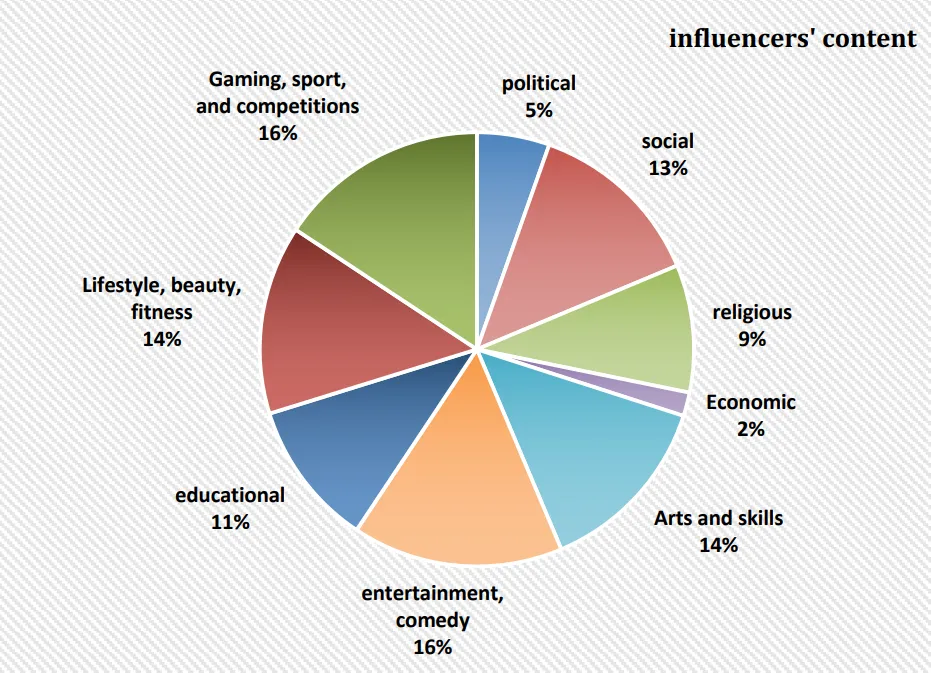
Source: Natural Sciences Publishing
This article provides a deeper look at social media platforms as the crucial instruments for affiliate marketing businesses.
What Is Social Media Affiliate Marketing?
Social media affiliate marketing comes to life through posting unique affiliate links on Instagram stories, YouTube reviews, Facebook groups, Twitter threads, and other social media channels used by content creators to interact with their followers. This affiliate marketing strategy is distinctive because it uses established mediums and allows potential buyers to connect with product or service providers most naturally. Such an approach feels organic compared to traditional advertising and often enriches the influencer’s content while allowing for an increase in profits.
Here’s a breakdown explaining how it works and why it has become so popular to use social media for affiliate marketing business:
- Affiliate partnership: The first step to affiliate marketing with social media involves finding a business with social media affiliate programmes and receiving affiliate links or codes to integrate into your content. Alternatively, you can connect with advertisers or trading platforms, like Amazon, that work with merchants directly.
- Promotion on social media: During this stage, affiliates (also called publishers) use their affiliate digital marketing platforms to introduce their audience to specific products or brands. This is done through the links or codes acquired from social media marketing affiliate programmes. These codes function as links connected to anchors, much like typical hyperlinks, and are organically woven into the content.
- Earning commission: When followers click on affiliate social media marketing links, they are directed to the advertisers’ pages. Thanks to the unique nature of the link they used, the advertiser can identify that the leads have come from you. The tracking of clicks and leads can be managed through affiliate marketing software, and publishers can be reworded for impressions, clicks, or conversions, depending on the terms of the social media affiliate programme.
Employing social media for affiliate marketing is straightforward. Nevertheless, it opens up myriads of combinations and opportunities for influencers with global reach and those catering to smaller, niche-oriented audiences.
Why Use Social Media Affiliate Marketing?
Affiliate marketing through social media provides a strategic fusion of entertainment platforms, influence, and commerce. It uses social networks based on different factors—personal relations, shared professional or lifestyle interests, demographics, and location—allowing promotions to spread across many verticals simultaneously. Not only does affiliate marketing on social media capitalise on the benefits of these networks, but it also makes them more attractive to users by providing relevant content and motivating content creators with incentives.
Social media platforms offer advantages to both advertisers and publishers. Understanding them will help influencers decide which affiliate networks are more financially rewarding and allow advertisers to select the best social media for affiliate marketing and partners that align with their goals and target audiences.
Leverage Trusted Social Media Affiliate Channels
Social media influencers are content creators with followers who trust them. The information about products or services they provide doesn’t come as sales pitches but as helpful expert insights that users can consider. This type of promotion respects the audience’s time and is not intrusive.
Behind every trusted recommendation lies the influencer’s hard work and dedication to building a relationship with the audience. This dynamic creates a loop where the influencer feels obliged to promote only high-quality products to continue enjoying the audience’s trust, grow the number of followers, and become more valuable to advertisers.
Example of advertising on Instagram with social media affiliate links:

Source: Quora
61% of users are likely to trust recommendations from social media influencers, while only 38% trust recommendations directly from a brand. These statistics prove that affiliate marketing online strategies have a significant influence on consumer behaviour, surpassing that of social media ads.
Improve Brand Awareness Through Social Media Affiliates
Social media affiliate marketing offers benefits usually delivered by two different strategies–reviews and advertising.
On one hand, social media users receive genuine reviews of services and products they can trust. These reviews are made not just by random people, or even bots in the worst-case scenario, but by real people who users know and respect. On the other hand, affiliate marketing works similarly to social media ads as it allows targeting a vast audience quickly.
The advantages of social media affiliate marketing can be used by both newly established companies and well-known brands. For startups, it provides a cost-effective solution to gain visibility through influencers’ channels. These influencers can introduce them to their audience, potentially increasing brand recognition and driving conversions.
Meanwhile, established brands can use social media for affiliate marketing as a method to reinforce their presence and stand out from the competition. Such a strategy is effective for launching new products and promoting existing ones.
Track and Attribute ROI
Each click, lead, or sale generated through social media affiliate links can be easily tracked and attributed to a specific campaign. Such a measurement method of measurement is hard to match in traditional advertising as it allows the companies to:
- Evaluate effectiveness of different compensation models: pay-per-click, pay-per-lead, pay-per-sale, or others
- Identify the best social media platforms for affiliate marketing
- Choose influencers that generate the highest numbers of conversions
- Determine which type of content (landing pages, product listings, contact forms) is the most effective
- Learn insights into customer preferences and behaviour
- Receive product feedback from a broad user base
If your company offers high-quality products or services, social media affiliate marketing is an effective long-term strategy with the highest ROI.
Make the Most of the Low-Risk Performance Marketing
Due to its nature, social media affiliate marketing embodies a low-risk, high-performance advertising strategy. For advertisers, it allows choosing among a range of payment methods, such as paying per conversion. This approach allows spending the promotional budget after the company receives actual money in the wallet.
Their upfront expenditure may occur only when signing up for an affiliate programme that requires sign-up payments. However, for established companies, it’s worth using their own digital communication channels to attract affiliates by creating affiliate programmes and optimising their promotion strategies.
On the flip side, content creators on social media platforms can find services and products they already use and love and seamlessly integrate links into their content.
Reach Out to the Right Audience
Affiliate marketing without social media channels lacks the precise audience targeting that social media platforms offer.
For once, businesses can scan the influencer’s audience to know exactly which demographics will be exposed to their products. This can be achieved by manually going through a list of subscribers, reading comments, and gauging the general vibe of the social media channel. These basic techniques facilitate the identification of ideal affiliates and the decision on the particular products and services to promote.
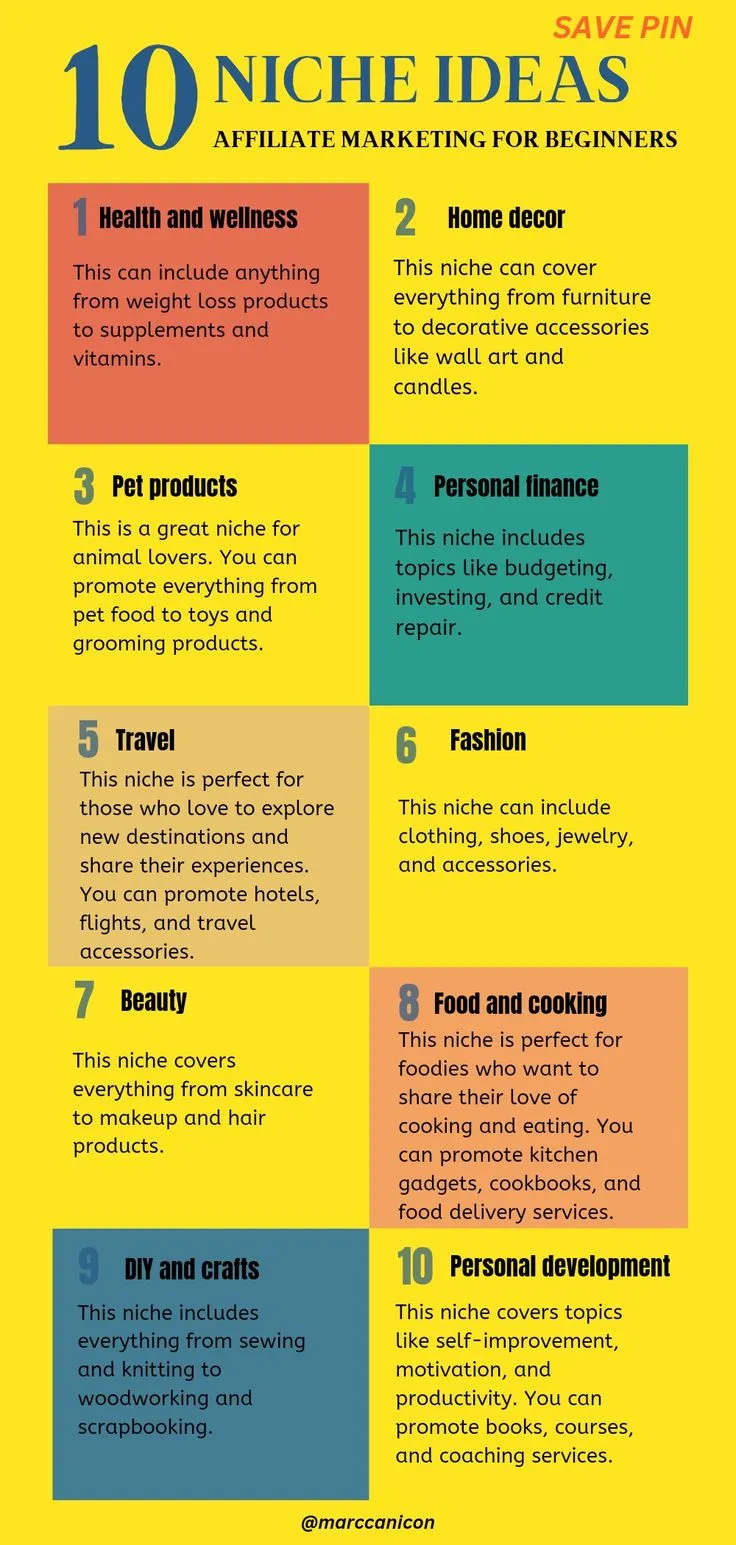
Source: Pinterest
In reverse, affiliate marketing on social media not only simplifies reaching the right audience but also enables studying the reaction of specific client segments to your offerings. For example, an advertiser may discover that their brand appeals to a certain audience, but the leads fail to convert. This indicates the brand targets correctly but needs to optimise promotion strategies, direct users to different landing pages, or advertise different products.
Are You Ready To Recruit Affiliates on Social Media?
Turning to affiliate marketing is a strategic move that requires close consideration. We’ve already mentioned its multiple benefits, particularly being a low-risk marketing strategy, prompting businessmen to use it ASAP.
However, it’s crucial to ensure you’re fully prepared for it so you don’t fail with your first experience in social media affiliate marketing and don’t get discouraged from this promising advertising opportunity. Before you dive into affiliate marketing social media networks, ensure you go through the following checklist:
- Identify specific, measurable goals for your affiliate programme. This includes understanding what you hope to achieve, such as increased sales, brand awareness, or customer acquisition.
- Define the type of affiliates that align with your brand, including their audience demographics, content style, and social media platforms where they are most active.
- Ensure you’re ready to provide affiliates with the necessary resources, including promotional materials, product samples, and any required training to help them successfully promote your brand.
- Employ a reliable system for tracking affiliate performance, including clicks, conversions, and sales, to accurately measure ROI and pay commissions.
- Develop clear guidelines that comply with legal requirements and ethical standards, including disclosure requirements for affiliates.
- Plan how to maintain ongoing communication and support with your affiliates, keeping them engaged and informed about new products, promotions, and changes to the programme.
- Ensure you’re prepared to regularly review your affiliate programme’s performance, gather feedback from affiliates, and make necessary adjustments to optimise success.
Social Media Affiliate Marketing Best Practises and Tips
With the benefits of enhanced brand visibility, building trust with the broader community, and increasing sales, it’s only natural that social media platforms are the focus of marketing strategies for businesses big and small. The ability to bid on these opportunities for free generates intense competition. Therefore, without a deeper understanding of the best practises for affiliate marketing on social media platforms, you’re bound to spend a lot of effort before reaching your goals.
Understand the Benefits of Different Social Media Platforms
Ideally, advertisers should use several platforms to reach out to different target groups and promote different targets. Here’s a quick summary of the most popular platforms to help decide which ones align with your target audience and current marketing strategies the most:
| The biggest social media platform for all demographics used by the majority of big-name companies | |
| TikTok | Short-form video platform with the highest annual growth rate in the US, favoured by younger users, ideal for trendy content |
| Photo and video sharing app with high engagement, popular with millennials and Gen Z | |
| Visual discovery engine, perfect for lifestyle and home improvement content | |
| YouTube | The largest video-sharing platform used by content creators for publishing in-depth tutorials, product reviews, and educational videos that monetise |
| Community-driven site with a variety of sub-platforms for niche interests and direct interaction between commenters and content creators |
Let’s proceed to the platform-related tips, and best practises for successful social media affiliate marketing.
Drive Organic Traffic With Social Media Affiliate Marketing
In contrast to paid advertising, organic traffic comes from unpaid communication channels. The rich organic traffic is often the result of many years of exploring target audience behaviour, studying relevant industry insights, improving communication skills, and using all that knowledge to create and publish content on social media.
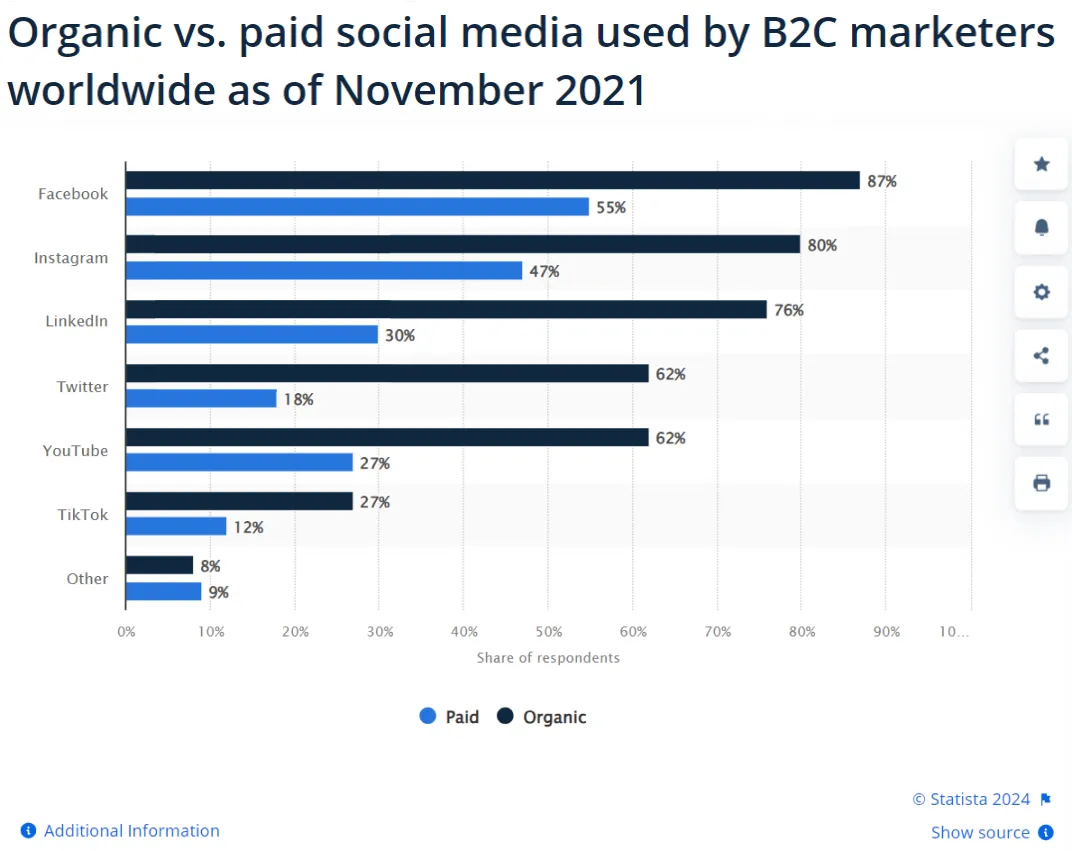
Source: Statista
Employing organic traffic for connecting companies with the public via social media affiliate links has several benefits over paid advertising:
- Cost efficiency: With no direct advertising costs spent by the publisher, the commission for posting affiliate links is typically lower.
- Enhanced trust: Social media users may find paid advertising intrusive and disrupt their browsing experience. Products in paid ads are there because companies have paid for their advertising, while organic content shows what content authors like and vouch for.
- Prolonged visibility: Paid ads lose traffic once the sponsored advertising period is over. Conversely, engaging organic content continues to attract viewers for a long time.
Optimise Your Accounts on Social Media for Affiliate Marketing
While connecting with your target audience through popular influencers is a powerful promotional method, don’t overlook creating and optimising your own social media affiliate accounts. It is a cost-effective strategy aimed at expanding your digital presence and enhancing long-term marketing strategies.
Ensure that all content on your social media affiliate accounts aligns with your marketing goals. Use these simple yet effective practises to create additional pathways for your affiliate marketing traffic:
- Include social media affiliate links in your biography or company profiles, turning these areas into traffic-generating instruments
- Employ a cross-promotional strategy to link your multiple social media pages on different platforms and drive traffic between them
- Share links to exclusive or time-limited coupon codes for promotions to attract new subscribers and increase the value of following your social media affiliate accounts
Use TikTok Affiliate Marketing for Promotions
Affiliate marketing on TikTok can be rewarding if your target audience is younger adults. Typically, TikTok influencers have highly engaged audiences, which is one of the factors for higher click-through rates than other social media, even if they post dozens of videos daily.
However, influencers with more followers often have a lower video view rate. For example, content creators with less than 5,000 followers have a 25% followers-to-viewers rate, while those with over 100,000 followers only achieve a rate of 5%. Consider these statistics when planning on affiliate marketing with TikTok affiliate links, as the more effective strategies may involve betting on niche-oriented influencers with smaller audiences than hyper-popular TikTokers with lower engagement rates and higher commissions.
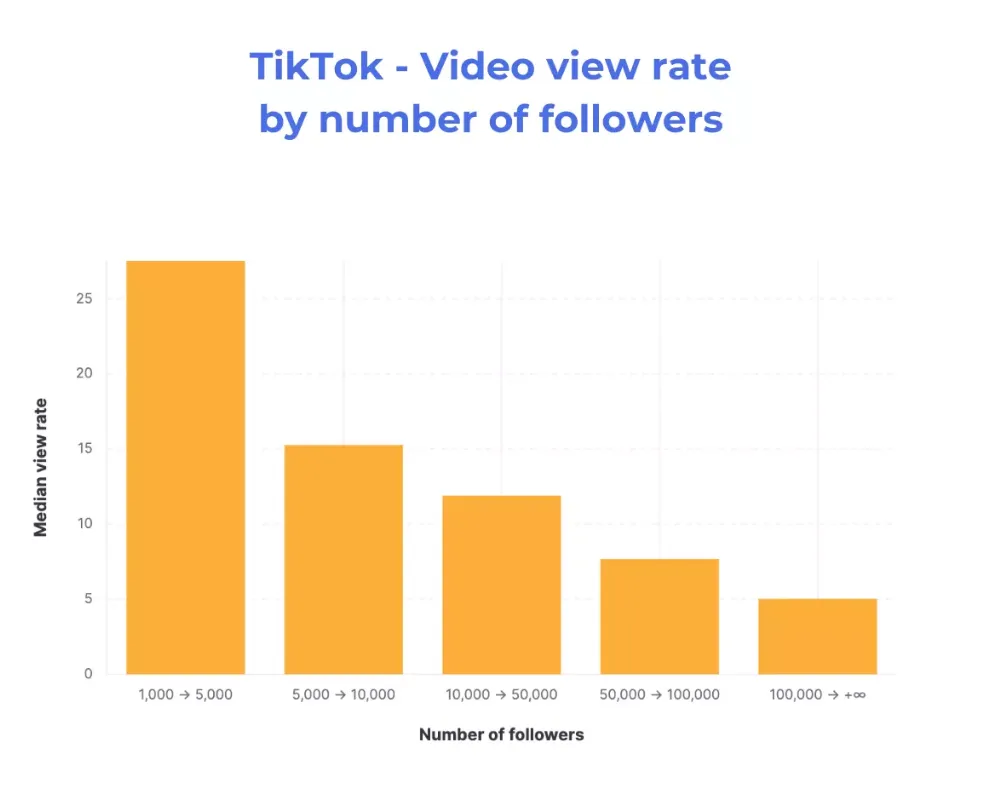
Source: Social Insider
Finally, remember that TikTok videos usually have a short lifespan of popularity, making the argument for prolonged visibility of organic content less significant in TikTok. So, using affiliate marketing TikTok ads is reasonable, especially if you offer popular products.
Discover How To Do Affiliate Marketing on Pinterest
Pinterest is the platform where users go for various DIY ideas, home decor designs, fashion trends, and inspirations for many other interests. However, due to its visual nature, viewers often come with a high intent to purchase while the Rich Pins feature allows posting affiliate links on Pinterest.
To start using Pinterest for affiliate marketing, follow these steps:
- Establish a business account for affiliate marketing on Pinterest to access advanced content management options
- Create engaging visual content targeting an audience from a specific niche that the product you promote belongs to
- Use hashtags and keywords to ensure your Pinterest affiliate marketing targets the individuals who are likely to convert
- Employ Product Pins – the type of Rich Pins that allow displaying various product information and connecting your posts with your website or completing purchases within the Pinterest platform
Follow Pinterest rules on affiliate links that promote transparency and prevent spammy practises
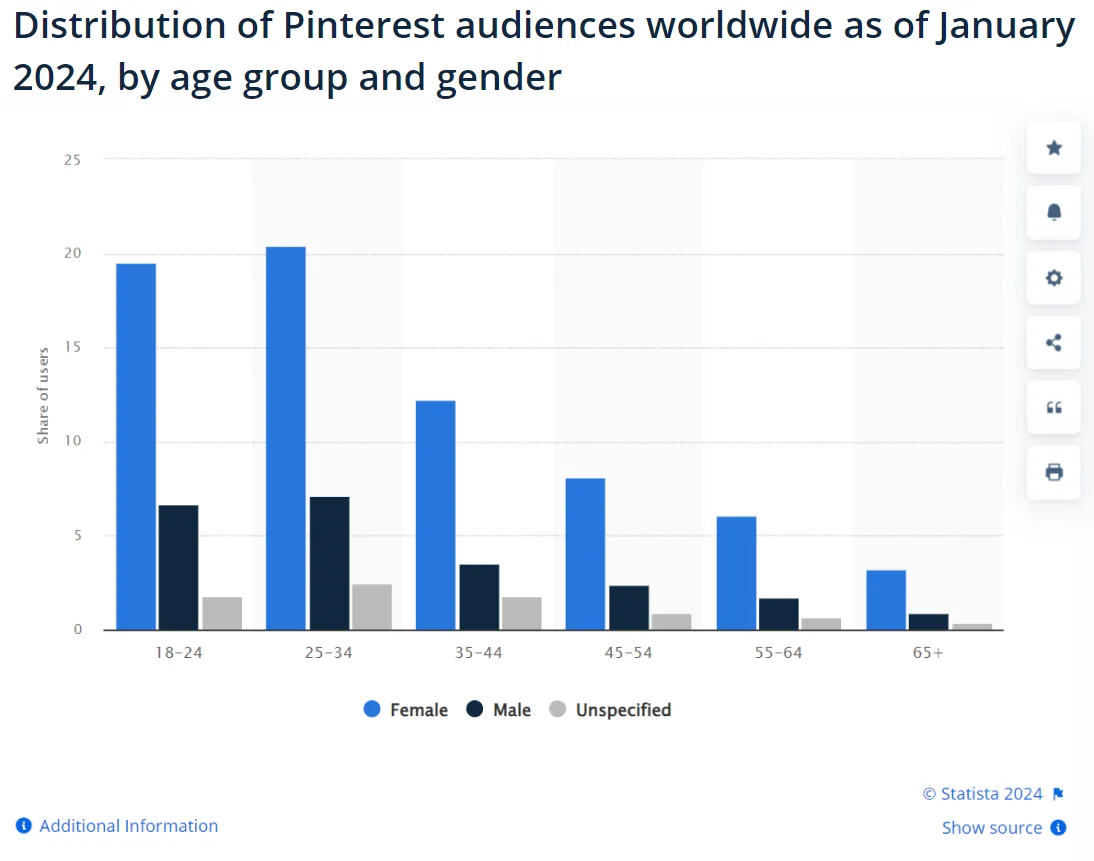
Source: Statista
While Pinterest users are more likely to visit Pinterest monthly, with only 18.6% stating they use it on a daily basis, affiliate marketing with Pinterest posts proves effective for reaching a high-conversion audience. Additionally, Pinterest pins have a longer lifespan than other platforms’ content, with well-optimised accounts driving traffic months and years after publication.
Use Dedicated URLs in YouTube Videos
YouTube is a global platform that needs no introduction. However, some may still wonder how to make money with affiliate marketing if the aim of the platform is to present videos, not links. The solution is quite straightforward, and its effectiveness has been proven.
It is common for affiliates to post affiliate links in the video description. These links are typically embedded in simplified URLs and lead to landing or product pages with products or services related to or described in the video.
To further increase the effectiveness of social media affiliate links, video content creators often mention the links in the description and encourage users to click on them. Sometimes, these links provide exclusive offers or discounts just for their audience. It is common for YouTubers to refer to advertiser businesses as their channel’s sponsors and mention that using affiliate links helps them earn incentives. This transparency about affiliate partnerships makes affiliate marketing on YouTube an effective and non-intrusive strategy.
Which Social Media Is Best for Affiliate Marketing?
If you still think there is one social media for affiliate marketing that will fulfil every business’s needs, you might need to reconsider. The truth is that the “best” quality depends on a combination of factors, such as the nature of the promoted product and marketing goals. For example, affiliate marketing through TikTok videos might work better for tech gadgets, while landscaping services sell better on Pinterest, where users often look for home design ideas.
Overall, you should learn products, brands, and product affiliates to find the perfect match for effective marketing campaigns:
- The targeted demographics of the company and the publisher’s audience
- Marketing goals, such as increasing sales, boosting brand visibility, or enhancing reputation–different platforms are optimised for different goals
- The type of affiliate products to find the platform or affiliate specialising in that particular niche
- The advertised company stage of growth–startups and established entities require different approaches
Strengthen Your Affiliate Marketing Strategy With T Dot UK
Directly buying affiliate traffic can substantially enhance your company’s growth. Many advertisers already trust T Dot UK to drive their marketing campaigns or accompany other marketing efforts, such as social media affiliate marketing.
Join us as an affiliate or advertiser. For more information, call 01202 122 280 or email us at info@t.uk.
Frequently Asked Questions
What are affiliate links?
Affiliate links function like typical hyperlinks, leading users to the landing or product pages. However, unlike standard URLs, affiliate links contain unique codes that allow advertisers to track the lead source and pay commissions to publishers.
Does Pinterest allow affiliate links?
Pinterest Product Pins feature enables linking posts with landing and product pages. This approach allows you to link your Pinterest account with your page containing affiliate links or direct users to advertisers’ pages via dedicated URLs. Remember that Pinterest verifies whether links lead to related pages to maintain content trustworthiness on the platform.
How to use TikTok for affiliate marketing
If you’re interested in starting affiliate marketing campaigns on TikTok, follow these steps:
- Ensure that mostly younger TikTok’s user base aligns with your targeted audience
- Partner with TikTokers, who already have many followers and whose content is thematically close to your affiliate products
- If you’re launching a TikTok affiliate account yourself, remember that links in video captions aren’t clickable; instead, post links in your bio and encourage users to visit it
Before launching the campaign, browse the platform to get affiliate marketing TikTok ideas and enhance your efficiency right from the start


